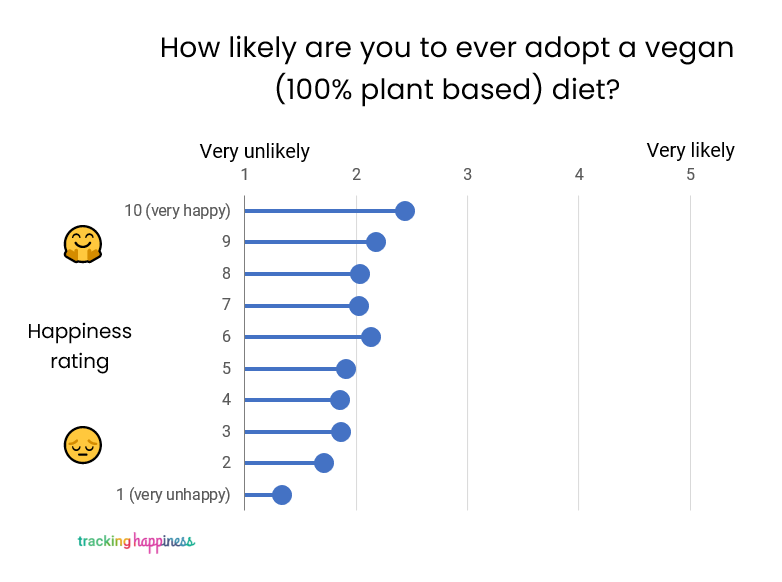[su_note note_color=”#ffe3e6″]This post contains affiliate links. Affiliate disclosure: As an Amazon Associate, we may earn commissions from qualifying purchases from Amazon.com and other Amazon websites.[/su_note]
Vegans are 7% happier than meat-eaters. Additionally, a person’s happiness is positively correlated to the likelihood of adopting a vegan diet in the future.
A new study performed by Tracking Happiness called ‘Eat Green, Be Happy: Evidence Of The Connection Between Veganism And Happiness’ found these correlations by analyzing 11,537 survey responses.
Key highlights from the study:
- Vegans report higher happiness levels than meat-eaters (+7%).
- Happier people are more likely to turn 100% vegan in the future.
- Only 14% of our meat-eating respondents reported a negative bias towards vegans. Non-vegans aren’t nearly as opposed to veganism as the stereotypes suggest.
- 32% of vegans & vegetarians state that their biggest driver is the environment.
- Older people are less likely to ever adopt a vegan diet.
Happy people more likely to turn vegan in the future
The study found that happier individuals consider themselves more likely to turn vegan in the future. Out of the 8,988 meat-eaters in our survey, those who reported higher happiness ratings were more likely to adopt a 100% plant-based diet in the future.

It was also found that age was inversely correlated with a person’s likelihood of becoming vegan.
Based on these results, it can be said that the world is slowly becoming more accepting of veganism. Young people consider themselves more likely to adopt a plant-based diet in the future, as well as happier people. Therefore, it can be assumed that the world will become more vegan as people slowly age and make room for new generations.
One of the authors of the study – Hugo Huijer – comments on the importance of discussing veganism as a topic:
We believe that happiness and sustainability go hand in hand. Sustainable behavior is linked to increased mental health, which is why it’s so important to talk about the consumption of animal products. Even though the positive environmental effect of veganism cannot be disputed, there is still a negative stigma surrounding people who claim to be vegan.
He goes on:
We landed on this study subject when we found that data on vegan stigmas and happiness is either lacking or outdated. And since it’s clear that people generally only change their opinions when faced with new data and facts, we want to provide a meaningful source of information that could stimulate this change. We sincerely hope that our findings help people make informed decisions regarding sustainability, happiness and the consumption of animal products.
It’s true that vegan stigmas have been around for a long time. Veganism and mental health are two polarizing topics. When it comes to the effect of meatless diets and mental health, there’s a lot of disagreement. Even in academic circles, studies are conflicting about veganism and mental health. There are studies claiming that veganism or vegetarianism is correlated to increased chances of depression. The linked study mentions “clear evidence” that shows vegetarians are more prone to depression, anxiety, and self-harm compared to meat-eaters. They found this by analyzing 18 previous studies that matched their filter criteria.
However, a randomized controlled trial within one of those 18 studies found that vegetarians reported significantly better moods than omnivores.
Another study – which also used self-reported mood levels – found that:
Restricting meat, fish, and poultry improved some domains of short-term mood state in modern omnivores. To our knowledge, this is the first trial to examine the impact of restricting meat, fish, and poultry on mood states in omnivores.
The new study from Tracking Happiness proves that vegans (and vegetarians) report higher happiness levels than meat-eaters.
The People for the Ethical Treatment of Animals (PETA) came out with a comment on the study. Their Vice President of International Programmes Mimi Bekhechi found the results to be in line with PETA’s own philosophy:
It’s no wonder vegans are happier – by sparing animals atrocious suffering, helping to save the planet, and improving their own health, vegans can enjoy peace of mind and a clean conscience. If you want to join the happy v-gang, you’re in luck: going vegan has never been easier or tastier..
Francine Jordan – spokesperson for the Vegan Society also commented on the study:
We’re not surprised by these findings at all. We know that the image of veganism is undergoing the most radical change in its history, while shedding some tired, old stereotypes. It’s no longer portrayed as an unusual lifestyle, it’s easy and accessible – you can walk into any supermarket and be greeted by a huge range of plant-based products or walk into any restaurant and be presented with an exciting vegan menu. There has never been a better time to be vegan and it’s great to see that vegans are much happier too!
About Tracking Happiness
Tracking Happiness helps people from around the world make sense of their happiness. The Tracking Happiness Diary helps people to track and learn from their happiness. Tracking Happiness is a small international team, dedicated to collecting and analyzing data about happiness and reporting it in a creative way.



